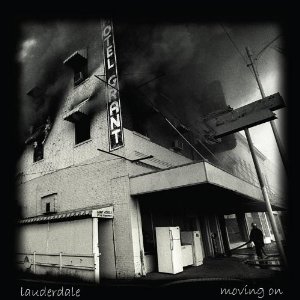
Self-released
The opening moments of the first cut on Lauderdale’s Moving On – the title song, actually – are frightening, beautiful, and totally arresting.
The first thing you hear is a starkly-strummed acoustic guitar, beginning with the pick dragged from the treble string across to a ringing, open bass E. Then, purposeful slow-chunked E-minor chords: the guitar is perfectly recorded, right in your lap and all around you at the same time.
Frontman Niles Lee’s voice is next, as he launches into the first verse:
I know Heaven don’t want me
And I ain’t nothing that Hell needs
Listening to Lee is like watching a baseball pitcher who appears to be out of control – winding up and letting it fly with seemingly reckless abandon – but lays it right over the plate every time. In the second or so that Lee’s voice clears a path through the drawled-out syllables of the word “Heaven,” you’re convinced that he’s already blown the vocal in a slurry highside, but no: he lands perfectly, lightly delivering the next few words. Again, his voice almost cracks on the word “Hell,” but it doesn’t. There’s weariness, but there’s strength, too. You’re already hooked and the song’s only 20 seconds old.
Judgmental eyes and religion tossed
No I ain’t been saved but ain’t been lost
“Ain’t” is at least a two-syllable word in this case, emphasizing just how much the singer is lugging. It’s still just Lee and his guitar for the first few words of the second verse:
I only dream in black and white, he begins, joined on the word “black” by a loping drum beat, the rest of the band tumbling into place behind it.
That is if I get to sleep at night
Because my past it still haunts me
And every night I relive everything
Over the course of the next few minutes of “Moving On”, you’re given ample opportunity to discover just what Lauderdale is all about. Drummer Patrick McDonald and bassist Matt Green are solid and tasteful, as is Ben Tanner’s piano work. (Tanner has a repeating passage between verses – a simple, unadorned, slow walk down the piano keys that will make the hair stand up on your arms. You couldn’t program that much emotion into a wall of synthed keys.) Lee’s guitar and voice soldier on honestly. And weaving through it all is the pedal steel of Daniel Stoddard. Stoddard’s playing will remind you of the late, great Ben Keith: no brace-off-and-let-it-fly moments; just dollops of subtle sonic seasoning to the song’s broth of dark ache.
It’s a 5-minute-and-26-second crash course in what a band who knows what they’re capable of and also knows just how to dole it out to the rest of the world sounds like. Too much of anything would kill the moment; in this case, there’s just enough of everything to tell the story and draw you in.
Hailing from Muscle Shoals, Alabama, Lauderdale comes by their countrified soul naturally, but there are many more colors in their palette: consider “The Grant”, with Lee and the band sounding like a young Steve Earle fronting a Trace -era Son Volt, guitars a’snapping and a’biting and just enough of a jam at the end to let you know that they could if they wanted to. Or “Torn At The Seams”, which is a lesson in styles of flannel: we have the grungy, punkish churn of the intro and verses, which gives way to the lighter, Saturday boot stomp of the choruses.
This is a band with a killer grasp of dynamics, building massive walls of sound on songs such as “Drink To Sleep” and “The Cost” that vaporize at the drop of a tattered ball cap, leaving the emotion of the moment wide open and unprotected. On “Broken Man” a caring, gentle banjo caresses the words on a soft bed of keys, while Stoddard’s pedal steel paints pictures in “Big Fish” almost as vivid as Lee’s vocal.
Lauderdale plays well beyond their years in terms of taste and control. Some bands work forever to attain this level of maturity; some never do.
Pay attention to Lauderdale.



No Comments comments associated with this post